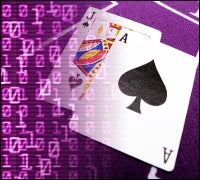 |
As revenue shortages continue to weigh on federal and state budgets, officials have been looking for new sources of income at every turn. That pressure has seen renewed calls for legalizing and taxing marijuana, new efforts to clamp down on online sales tax collection and, most recently, a push to reverse the ban on Internet gambling.
Online gambling proponents have found an outspoken advocate in Sen. Robert Menendez (D-N.J.), who has introduced a bill that would establish a framework for licensing and taxing revenues from legitimate online poker and other gaming sites in an effort to raise revenue for cash-strapped states and the federal government.
Menendez’s bill would allow Internet poker sites to apply for a federal license to establish themselves as legitimate businesses, subject to federal and state regulation and taxation in a move the senator estimates could net the government more than $3 billion in annual revenue.
The bill would set a tax of 10 percent on deposits made into playing accounts at online gambling sites, in addition to normal taxes on corporate income and withholding taxes from players’ net winnings.
“Pulling Internet poker out of the shadows and into the light of the law, we have the opportunity to help our economy while protecting our families,” Menendez said in a statement.
The bill aims to draw a clear line between the legitimate sites and the scams. To secure a license, a gaming site would have to submit to a thorough review by the Treasury Department, which would probe the applicant’s financial condition and business record, and conduct a background check for its proprietors. Any application from a person previously convicted anywhere in the world of violating a gambling, financial or information security law would be automatically rejected.
In longhand, the bill is called the Internet Poker and Games of Skill Regulation, Protection and Enforcement Act.
Menendez’s effort to decriminalize Internet gambling in the United States echoes similar calls from other lawmakers, most notably Barney Frank, the chairman of House Financial Services Committee. Frank has been a prominent supporter of reversing the 2006 law that banned most forms of online gambling. In May, he introduced a bill that, similar to Menendez’s, would create a federal licensing and regulatory system for online gaming sites that proved themselves legitimate.
The U.S. policy on Internet gambling has also come under fire from the European Union, which has argued that continued legal actions against offshore gaming companies in Europe and elsewhere is inconsistent with the rules of the World Trade Organization.
“Internet gambling is a complex and delicate area, and we do not want to dictate how the U.S. should regulate its market. However, the U.S. must respect its WTO obligations,” EU Trade Commissioner Catherine Ashton said in June.
Ashton’s comments were more conciliatory than previous statements from EU officials, who in the past have pressed U.S. lawmakers to reverse the ban on Internet gambling.
But critics of the practice have noted the financial and social toll the sites take on their users, particularly minors and young adults.
Under Menendez’s bill, in order for gaming sites to maintain their licenses, they would be required to enact safeguards to verify that players are adults and protect users’ privacy. Sites would also be directed to monitor for signs of compulsive gambling and ensure that games are fair and guard against fraud and money laundering schemes.
“The safety benefits of the bill are particularly crucial,” Menendez said. “Parents are worried about their children falling prey to illegitimate gaming sites and thousands of Americans have been fleeced of millions of dollars by these sites. With proper regulation, we can prevent minors from playing poker online, crackdown on predatory operations, and sanction the legitimate ones.”
Menendez’s bill would allow any state or autonomous Indian tribe to opt of the regulation and keep gaming sites illegal in its jurisdiction.


